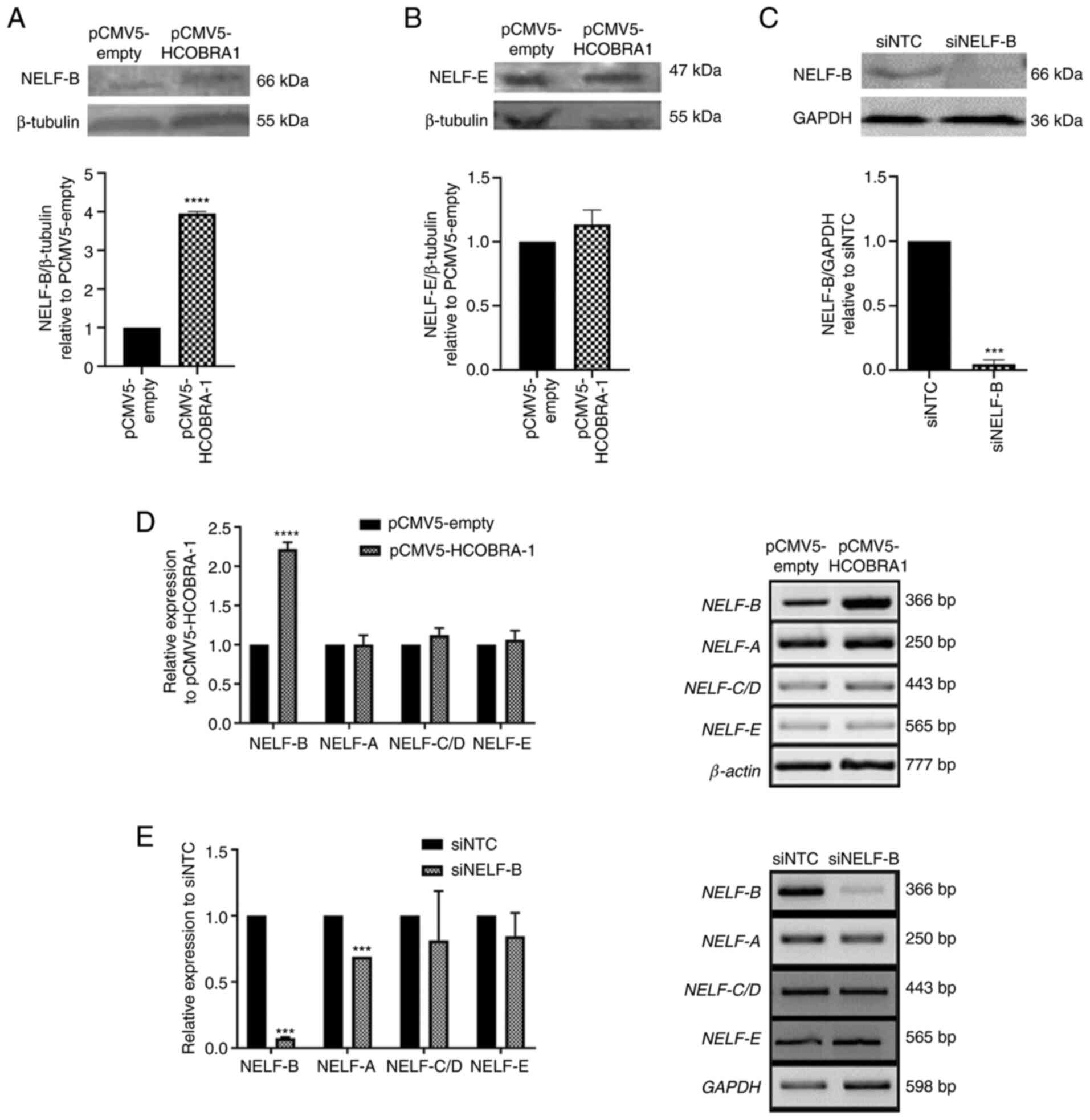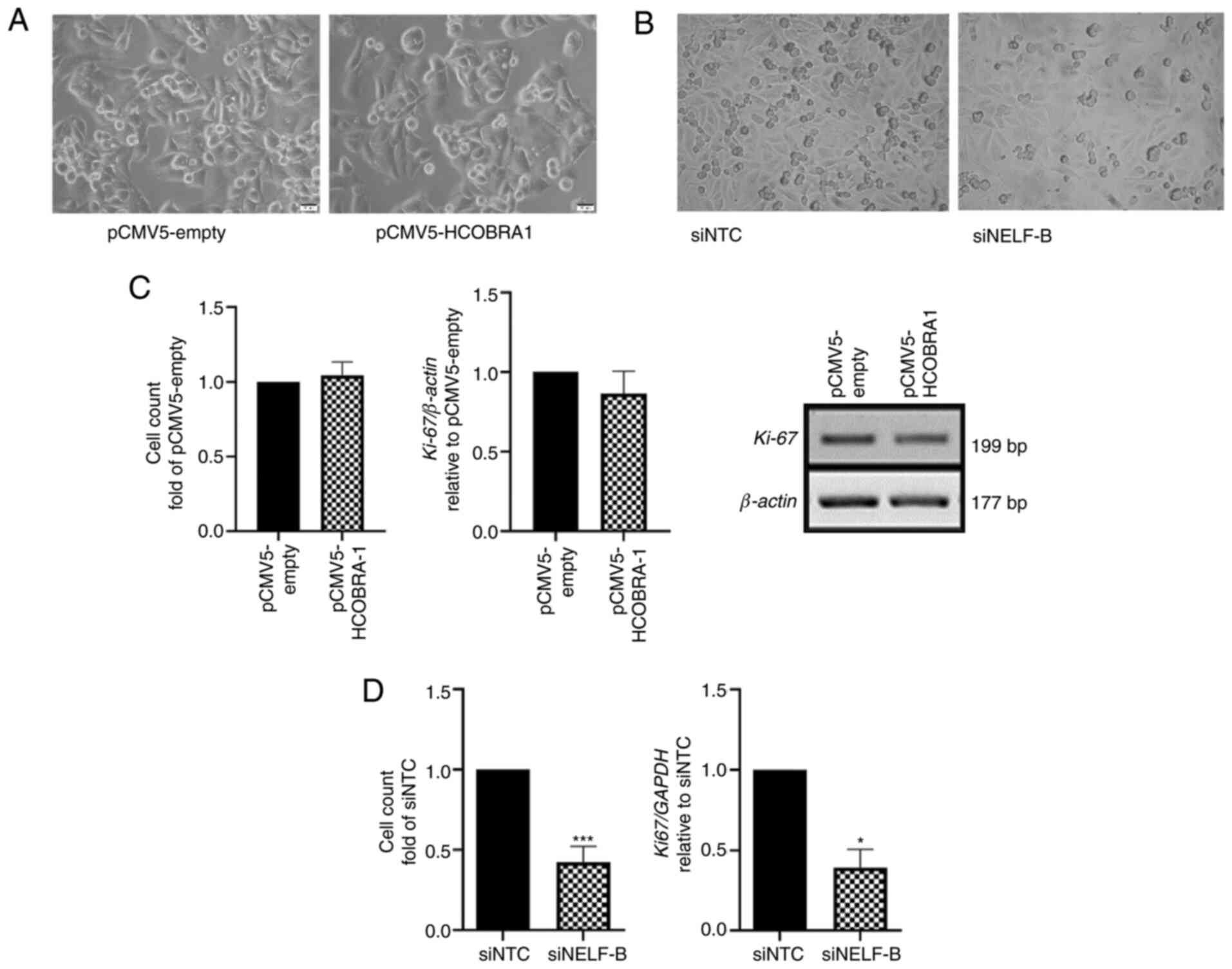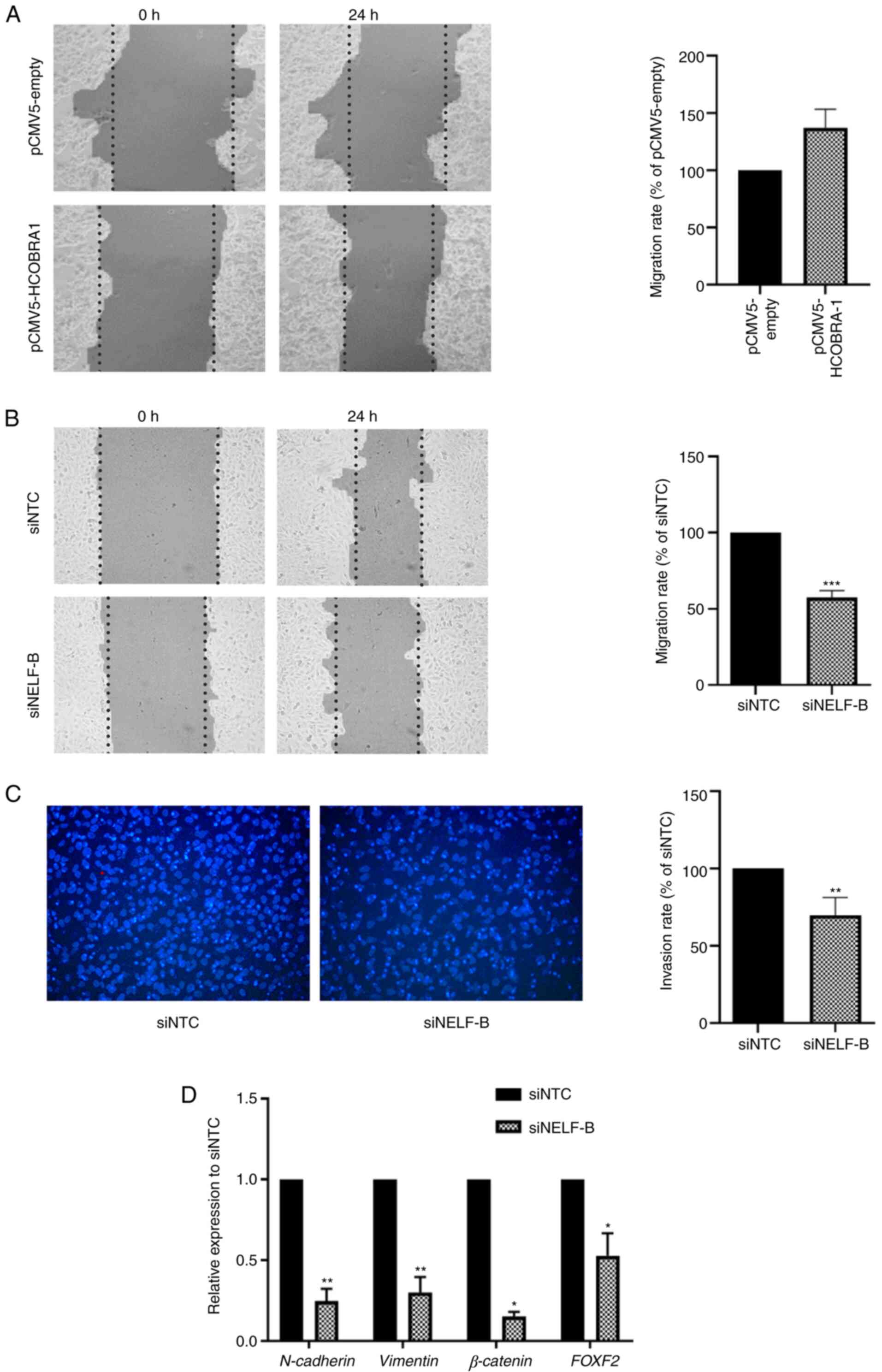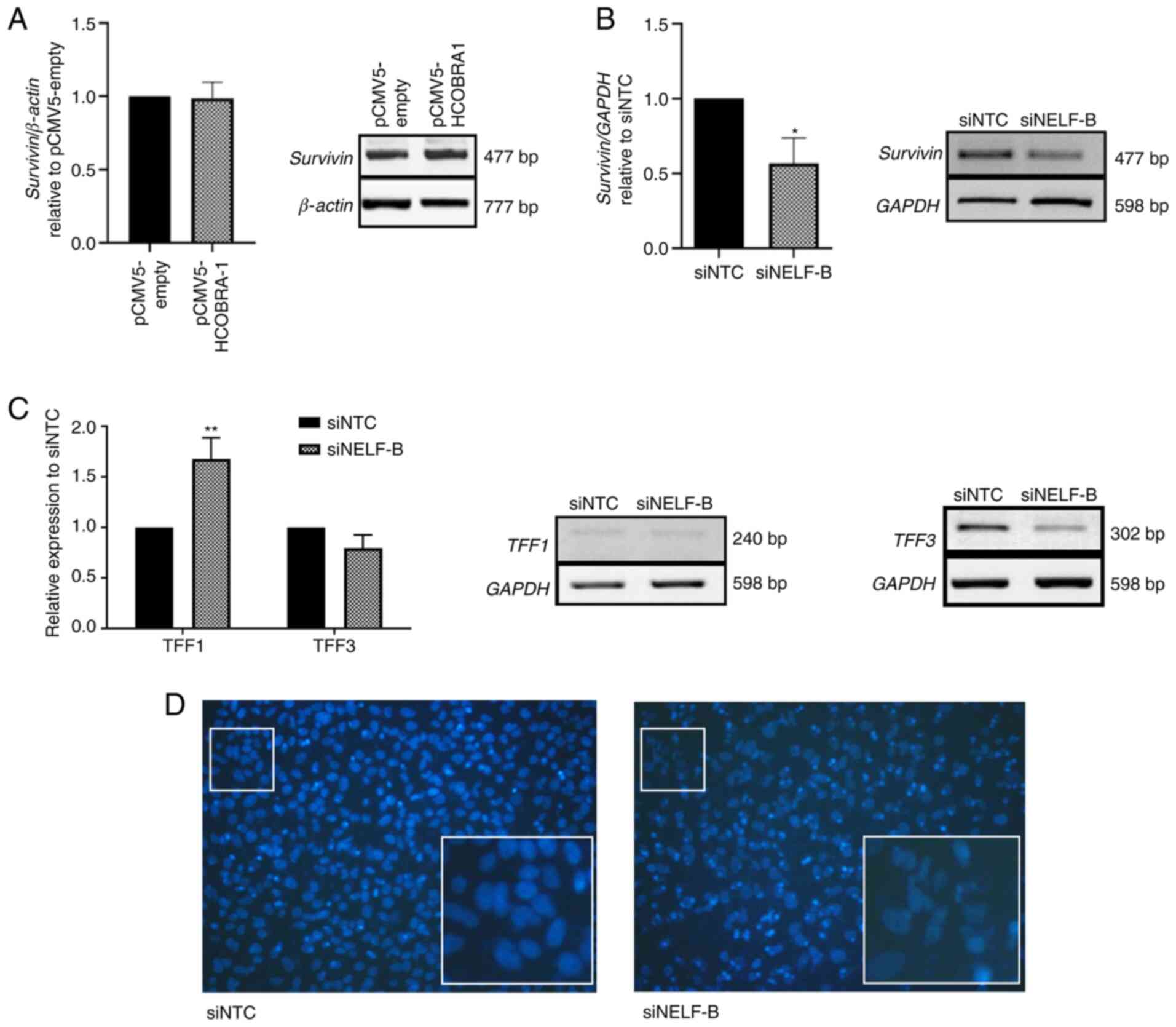|
1
|
Bray F, Ferlay J, Soerjomataram I, Siegel
RL, Torre LA and Jemal A: Global cancer statistics 2018: GLOBOCAN
estimates of incidence and mortality worldwide for 36 cancers in
185 countries. CA Cancer J Clin. 68:394–424. 2018. View Article : Google Scholar : PubMed/NCBI
|
|
2
|
Simonetti RG, Liberati A, Angiolini C and
Pagliaro L: Treatment of hepatocellular carcinoma: A systematic
review of randomized controlled trials. Ann Oncol. 8:117–136. 1997.
View Article : Google Scholar : PubMed/NCBI
|
|
3
|
Chidambaranathan-Reghupaty S, Fisher PB
and Sarkar D: Hepatocellular carcinoma (HCC): Epidemiology,
etiology and molecular classification. Adv Cancer Res. 149:1–61.
2021. View Article : Google Scholar : PubMed/NCBI
|
|
4
|
Zhao YJ, Ju Q and Li GC: Tumor markers for
hepatocellular carcinoma. Mol Clin Oncol. 1:593–598. 2013.
View Article : Google Scholar : PubMed/NCBI
|
|
5
|
Sanyal AJ, Yoon SK and Lencioni R: The
etiology of hepatocellular carcinoma and consequences for
treatment. Oncologist. 15 (Suppl 4):S14–S22. 2010. View Article : Google Scholar
|
|
6
|
Dong Y, Wang WP, Mao F, Zhang Q, Yang D,
Tannapfel A, Meloni MF, Neye H, Clevert DA and Dietrich CF: Imaging
features of fibrolamellar hepatocellular carcinoma with
contrast-enhanced ultrasound. Ultraschall Med. 42:306–313. 2021.
View Article : Google Scholar : PubMed/NCBI
|
|
7
|
Jiang HY, Chen J, Xia CC, Cao LK, Duan T
and Song B: Noninvasive imaging of hepatocellular carcinoma: From
diagnosis to prognosis. World J Gastroenterol. 24:2348–2362. 2018.
View Article : Google Scholar : PubMed/NCBI
|
|
8
|
Andreana L, Isgrò G, Pleguezuelo M,
Germani G and Burroughs AK: Surveillance and diagnosis of
hepatocellular carcinoma in patients with cirrhosis. World J
Hepatol. 1:48–61. 2009. View Article : Google Scholar : PubMed/NCBI
|
|
9
|
Janevska D, Chaloska-Ivanova V and
Janevski V: Hepatocellular carcinoma: Risk factors, diagnosis and
treatment. Open Access Maced J Med Sci. 3:732–736. 2015. View Article : Google Scholar : PubMed/NCBI
|
|
10
|
Dhanasekaran R, Bandoh S and Roberts LR:
Molecular pathogenesis of hepatocellular carcinoma and impact of
therapeutic advances. F1000Res. 5:F1000 Faculty Rev. –879. 2016.
View Article : Google Scholar : PubMed/NCBI
|
|
11
|
Ye Q, Hu YF, Zhong H, Nye AC, Belmont AS
and Li R: BRCA1-induced large-scale chromatin unfolding and
allele-specific effects of cancer-predisposing mutations. J Cell
Biol. 155:911–921. 2001. View Article : Google Scholar : PubMed/NCBI
|
|
12
|
Narita T, Yamaguchi Y, Yano K, Sugimoto S,
Chanarat S, Wada T, Kim DK, Hasegawa J, Omori M, Inukai N, et al:
Human transcription elongation factor NELF: Identification of novel
subunits and reconstitution of the functionally active complex. Mol
Cell Biol. 23:1863–1873. 2003. View Article : Google Scholar : PubMed/NCBI
|
|
13
|
Wada T, Takagi T, Yamaguchi Y, Ferdous A,
Imai T, Hirose S, Sugimoto S, Yano K, Hartzog GA, Winston F, et al:
DSIF, a novel transcription elongation factor that regulates RNA
polymerase II processivity, is composed of human Spt4 and Spt5
homologs. Genes Dev. 12:343–356. 1998. View Article : Google Scholar : PubMed/NCBI
|
|
14
|
Yankulov K, Yamashita K, Roy R, Egly JM
and Bentley DL: The transcriptional elongation inhibitor
5,6-Dichloro-1-β-D-ribofuranosylbenzimidazole inhibits
transcription Factor IIH-associated protein kinase. J Biol Chem.
270:23922–23925. 1995. View Article : Google Scholar : PubMed/NCBI
|
|
15
|
Yamaguchi Y, Takagi T, Wada T, Yano K,
Furuya A, Sugimoto S, Hasegawa J and Handa H: NELF, a multisubunit
complex containing RD, cooperates with DSIF to repress RNA
polymerase II elongation. Cell. 97:41–51. 1999. View Article : Google Scholar : PubMed/NCBI
|
|
16
|
Yamaguchi Y, Filipovska J, Yano K, Furuya
A, Inukai N, Narita T, Wada T, Sugimoto S, Konarska MM and Handa H:
Stimulation of RNA polymerase II elongation by hepatitis delta
antigen. Science. 293:124–127. 2001. View Article : Google Scholar : PubMed/NCBI
|
|
17
|
Sun J, Watkins G, Blair AL, Moskaluk C,
Ghosh S, Jiang WG and Li R: Deregulation of cofactor of BRCA1
expression in breast cancer cells. J Cell Biochem. 103:1798–1807.
2008. View Article : Google Scholar : PubMed/NCBI
|
|
18
|
Sun J, Blair AL, Aiyar SE and Li R:
Cofactor of BRCA1 modulates androgen-dependent transcription and
alternative splicing. J Steroid Biochem Mol Biol. 107:131–139.
2007. View Article : Google Scholar : PubMed/NCBI
|
|
19
|
Zhong H, Zhu J, Zhang H, Ding L, Sun Y,
Huang C and Ye Q: COBRA1 inhibits AP-1 transcriptional activity in
transfected cells. Biochem Biophys Res Commun. 325:568–573. 2004.
View Article : Google Scholar : PubMed/NCBI
|
|
20
|
Aiyar SE, Sun JL, Blair AL, Moskaluk CA,
Lu YZ, Ye QN, Yamaguchi Y, Mukherjee A, Ren DM, Handa H and Li R:
Attenuation of estrogen receptor alpha-mediated transcription
through estrogen-stimulated recruitment of a negative elongation
factor. Genes Dev. 18:2134–2146. 2004. View Article : Google Scholar : PubMed/NCBI
|
|
21
|
Aiyar SE, Cho H, Lee J and Li R: Concerted
transcriptional regulation by BRCA1 and COBRA1 in breast cancer
cells. Int J Biol Sci. 3:486–492. 2007. View Article : Google Scholar : PubMed/NCBI
|
|
22
|
Aiyar SE, Blair AL, Hopkinson DA,
Bekiranov S and Li R: Regulation of clustered gene expression by
cofactor of BRCA1 (COBRA1) in breast cancer cells. Oncogene.
26:2543–2553. 2007. View Article : Google Scholar : PubMed/NCBI
|
|
23
|
McChesney PA, Aiyar SE, Lee OJ, Zaika A,
Moskaluk C, Li R and El-Rifai W: Cofactor of BRCA1: A novel
transcription factor regulator in upper gastrointestinal
adenocarcinomas. Cancer Res. 66:1346–1353. 2006. View Article : Google Scholar : PubMed/NCBI
|
|
24
|
Yun H, Bedolla R, Horning A, Li R, Chiang
HC, Huang TH, Reddick R, Olumi AF, Ghosh R and Kumar AP: BRCA1
interacting protein COBRA1 facilitates adaptation to
Castrate-Resistant growth conditions. Int J Mol Sci. 19:21042018.
View Article : Google Scholar : PubMed/NCBI
|
|
25
|
El Zeneini E, Kamel S, El-Meteini M and
Amleh A: Knockdown of COBRA1 decreases the proliferation and
migration of hepatocellular carcinoma cells. Oncol Rep.
37:1896–1906. 2017. View Article : Google Scholar : PubMed/NCBI
|
|
26
|
López-Terrada D, Cheung SW, Finegold MJ
and Knowles BB: Hep G2 is a hepatoblastoma-derived cell line. Hum
Pathol. 40:1512–1515. 2009. View Article : Google Scholar : PubMed/NCBI
|
|
27
|
Strober W: Trypan blue exclusion test of
cell viability. Curr Protoc Immunol. doi:
10.1002/0471142735.ima03bs21.
|
|
28
|
Schneider CA, Rasband WS and Eliceiri KW:
NIH Image to ImageJ: 25 years of image analysis. Nat Methods.
9:671–675. 2012. View Article : Google Scholar : PubMed/NCBI
|
|
29
|
Livak KJ and Schmittgen TD: Analysis of
relative gene expression data using real-time quantitative PCR and
the 2(-Delta Delta C(T)) method. Methods. 25:402–408. 2001.
View Article : Google Scholar : PubMed/NCBI
|
|
30
|
Jonkman JE, Cathcart JA, Xu F, Bartolini
ME, Amon JE, Stevens KM and Colarusso P: An introduction to the
wound healing assay using live-cell microscopy. Cell Adh Migr.
8:440–451. 2014. View Article : Google Scholar : PubMed/NCBI
|
|
31
|
Gebäck T, Schulz MMP, Koumoutsakos P and
Detmar M: TScratch: A novel and simple software tool for automated
analysis of monolayer wound healing assays. BioTechniques.
46:265–274. 2009. View Article : Google Scholar : PubMed/NCBI
|
|
32
|
Boleman AI, Tănasie G, Găluşcan A, Cristea
MI, Bojin FM, Panaitescu C and Păunescu V: Studies regarding the in
vitro wound healing potential of mouse dental pulp stem-like
progenitor cells. Biotechnol & Biotec Eq. 26:2781–2785. 2012.
View Article : Google Scholar
|
|
33
|
Kalluri R and Weinberg RA: The basics of
epithelial-mesenchymal transition. J Clin Invest. 119:1420–1428.
2009. View Article : Google Scholar : PubMed/NCBI
|
|
34
|
Cho SB, Lee KH, Lee JH, Park SY, Lee WS,
Park CH, Kim HS, Choi SK and Rew JS: Expression of E- and
N-cadherin and clinicopathology in hepatocellular carcinoma. Pathol
Int. 58:635–642. 2008. View Article : Google Scholar : PubMed/NCBI
|
|
35
|
Dahmani R, Just PA and Perret C: The
Wnt/β-catenin pathway as a therapeutic target in human
hepatocellular carcinoma. Clin Res Hepatol Gastroenterol.
35:709–713. 2011. View Article : Google Scholar : PubMed/NCBI
|
|
36
|
Khramtsov AI, Khramtsova GF, Tretiakova M,
Huo D, Olopade OI and Goss KH: Wnt/β-catenin pathway activation is
enriched in basal-like breast cancers and predicts poor outcome. Am
J Pathol. 176:2911–2920. 2010. View Article : Google Scholar : PubMed/NCBI
|
|
37
|
Kobayashi M, Honma T, Matsuda Y, Suzuki Y,
Narisawa R, Ajioka Y and Asakura H: Nuclear translocation of
β-catenin in colorectal cancer. Br J Cancer. 82:1689–1693.
2000.PubMed/NCBI
|
|
38
|
Dou C, Jin X, Sun L, Zhang B, Han M and Li
T: FOXF2 deficiency promotes hepatocellular carcinoma metastasis by
inducing mesenchymal-epithelial transition. Cancer Biomark.
19:447–454. 2017. View Article : Google Scholar : PubMed/NCBI
|
|
39
|
Fukuda S and Pelus LM: Survivin, a cancer
target with an emerging role in normal adult tissues. Mol Cancer
Ther. 5:1087–1098. 2006. View Article : Google Scholar : PubMed/NCBI
|
|
40
|
Kerr JF, Wyllie AH and Currie AR:
Apoptosis: A basic biological phenomenon with wide-ranging
implications in tissue kinetics. Br J Cancer. 26:239–257. 1972.
View Article : Google Scholar : PubMed/NCBI
|
|
41
|
Lacroix M: Significance, detection and
markers of disseminated breast cancer cells. Endocr Relat Cancer.
13:1033–1067. 2006. View Article : Google Scholar : PubMed/NCBI
|
|
42
|
Im S, Yoo C, Jung JH, Choi HJ, Yoo J and
Kang CS: Reduced expression of TFF1 and increased expression of
TFF3 in gastric cancer: Correlation with clinicopathological
parameters and prognosis. Int J Med Sci. 10:133–140. 2013.
View Article : Google Scholar : PubMed/NCBI
|
|
43
|
Vestergaard EM, Borre M, Poulsen SS, Nexø
E and Tørring N: Plasma levels of trefoil factors are increased in
patients with advanced prostate cancer. Clin Cancer Res. 12((3 Pt
1)): 807–812. 2006. View Article : Google Scholar : PubMed/NCBI
|
|
44
|
Yusufu A, Shayimu P, Tuerdi R, Fang C,
Wang F and Wang H: TFF3 and TFF1 expression levels are elevated in
colorectal cancer and promote the malignant behavior of colon
cancer by activating the EMT process. Int J Oncol. 55:789–804.
2019.PubMed/NCBI
|
|
45
|
Casado E, Garcia VM, Sánchez JJ, Gómez Del
Pulgar MT, Feliu J, Maurel J, Castelo B, Moreno Rubio J, López RA,
García-Cabezas MÁ, et al: Upregulation of trefoil factor 3 (TFF3)
after rectal cancer chemoradiotherapy is an adverse prognostic
factor and a potential therapeutic target. Int J Radiat Oncol Biol
Phys. 84:1151–1158. 2012. View Article : Google Scholar : PubMed/NCBI
|
|
46
|
Ochiai Y, Yamaguchi J, Kokuryo T, Yokoyama
Y, Ebata T and Nagino M: Trefoil factor family 1 inhibits the
development of hepatocellular carcinoma by regulating β-catenin
activation. Hepatology. 72:503–517. 2020. View Article : Google Scholar : PubMed/NCBI
|
|
47
|
You ML, Chen YJ, Chong QY, Wu MM, Pandey
V, Chen RM, Liu L, Ma L, Wu ZS, Zhu T and Lobie PE: Trefoil factor
3 mediation of oncogenicity and chemoresistance in hepatocellular
carcinoma is AKT-BCL-2 dependent. Oncotarget. 8:39323–39344. 2017.
View Article : Google Scholar : PubMed/NCBI
|
|
48
|
Youssef A, Shawer H, Afify A and Amleh A:
The potential involvement of the cofactor of BRCA1 in
hepatocellular carcinoma pathogenesis. Adv Mod Oncol Res.
2:2242016. View Article : Google Scholar : PubMed/NCBI
|
|
49
|
Hanahan D and Weinberg RA: The hallmarks
of cancer. Cell. 100:57–70. 2000. View Article : Google Scholar : PubMed/NCBI
|
|
50
|
Sun J and Li R: Human negative elongation
factor activates transcription and regulates alternative
transcription initiation. J Biol Chem. 285:6443–6452. 2010.
View Article : Google Scholar : PubMed/NCBI
|
|
51
|
Schlüter C, Duchrow M, Wohlenberg C,
Becker MH, Key G, Flad HD and Gerdes J: The cell
proliferation-associated antigen of antibody Ki-67: A very large,
ubiquitous nuclear protein with numerous repeated elements,
representing a new kind of cell cycle-maintaining proteins. J Cell
Biol. 123:513–522. 1993. View Article : Google Scholar : PubMed/NCBI
|
|
52
|
Hunter AM, LaCasse EC and Korneluk RG: The
inhibitors of apoptosis (IAPs) as cancer targets. Apoptosis.
12:1543–1568. 2007. View Article : Google Scholar : PubMed/NCBI
|
|
53
|
Ambrosini G, Adida C and Altieri DC: A
novel anti-apoptosis gene, survivin, expressed in cancer and
lymphoma. Nat Med. 3:917–921. 1997. View Article : Google Scholar : PubMed/NCBI
|
|
54
|
Han G, Gong H, Wang Y, Guo S and Liu K:
AMPK/mTOR-mediated inhibition of survivin partly contributes to
metformin-induced apoptosis in human gastric cancer cell. Cancer
Biol Ther. 16:77–87. 2015. View Article : Google Scholar : PubMed/NCBI
|
|
55
|
Su C: Survivin in survival of
hepatocellular carcinoma. Cancer Lett. 379:184–190. 2016.
View Article : Google Scholar : PubMed/NCBI
|
|
56
|
Giodini A, Kallio MJ, Wall NR, Gorbsky GJ,
Tognin S, Marchisio PC, Symons M and Altieri DC: Regulation of
microtubule stability and mitotic progression by survivin. Cancer
Res. 62:2462–2467. 2002.PubMed/NCBI
|
|
57
|
Suzuki A, Hayashida M, Ito T, Kawano H,
Nakano T, Miura M, Akahane K and Shiraki K: Survivin initiates cell
cycle entry by the competitive interaction with Cdk4/p16(INK4a) and
Cdk2/cyclin E complex activation. Oncogene. 19:3225–3234. 2000.
View Article : Google Scholar : PubMed/NCBI
|
|
58
|
O'Connor DS, Schechner JS, Adida C, Mesri
M, Rothermel AL, Li F, Nath AK, Pober JS and Altieri DC: Control of
apoptosis during angiogenesis by survivin expression in endothelial
cells. Am J Pathol. 156:393–398. 2000. View Article : Google Scholar : PubMed/NCBI
|
|
59
|
Kramer A, Liashkovich I, Oberleithner H,
Ludwig S, Mazur I and Shahin V: Apoptosis leads to a degradation of
vital components of active nuclear transport and a dissociation of
the nuclear lamina. Proc Natl Acad Sci USA. 105:11236–11241. 2008.
View Article : Google Scholar : PubMed/NCBI
|
|
60
|
Goldman RD, Khuon S, Chou YH, Opal P and
Steinert PM: The function of intermediate filaments in cell shape
and cytoskeletal integrity. J Cell Biol. 134:971–983. 1996.
View Article : Google Scholar : PubMed/NCBI
|
|
61
|
Mrozik KM, Blaschuk OW, Cheong CM,
Zannettino ACW and Vandyke K: N-cadherin in cancer metastasis, its
emerging role in haematological malignancies and potential as a
therapeutic target in cancer. BMC Cancer. 18:9392018. View Article : Google Scholar : PubMed/NCBI
|
|
62
|
Zhan DQ, Wei S, Liu C, Liang BY, Ji GB,
Chen XP, Xiong M and Huang ZY: Reduced N-cadherin expression is
associated with metastatic potential and poor surgical outcomes of
hepatocellular carcinoma. J Gastroenterol Hepatol. 27:173–180.
2012. View Article : Google Scholar : PubMed/NCBI
|
|
63
|
Zhou SJ, Liu FY, Zhang AH, Liang HF, Wang
Y, Ma R, Jiang YH and Sun NF: MicroRNA-199b-5p attenuates
TGF-beta1-induced epithelial-mesenchymal transition in
hepatocellular carcinoma. Br J Cancer. 117:233–244. 2017.
View Article : Google Scholar : PubMed/NCBI
|
|
64
|
Noordermeer J, Klingensmith J, Perrimon N
and Nusse R: Dishevelled and armadillo act in the Wingless
signalling pathway in Drosophila. Nature. 367:80–83. 1994.
View Article : Google Scholar : PubMed/NCBI
|
|
65
|
Peifer M, Berg S and Reynolds AB: A
repeating amino acid motif shared by proteins with diverse cellular
roles. Cell. 76:789–791. 1994. View Article : Google Scholar : PubMed/NCBI
|
|
66
|
Laurent-Puig P and Zucman-Rossi J:
Genetics of hepatocellular tumors. Oncogene. 25:3778–3786. 2006.
View Article : Google Scholar : PubMed/NCBI
|
|
67
|
Papkoff J, Rubinfeld B, Schryver B and
Polakis P: Wnt-1 regulates free pools of catenins and stabilizes
APC-catenin complexes. Mol Cell Biol. 16:2128–2134. 1996.
View Article : Google Scholar : PubMed/NCBI
|
|
68
|
Behrens J, von Kries JP, Kühl M, Bruhn L,
Wedlich D, Grosschedl R and Birchmeier W: Functional interaction of
β-catenin with the transcription factor LEF-1. Nature. 382:638–642.
1996. View Article : Google Scholar : PubMed/NCBI
|
|
69
|
Huber O, Korn R, McLaughlin J, Ohsugi M,
Herrmann BG and Kemler R: Nuclear localization of β-catenin by
interaction with transcription factor LEF-1. Mech Dev. 59:3–10.
1996. View Article : Google Scholar : PubMed/NCBI
|
|
70
|
Molenaar M, van de Wetering M, Oosterwegel
M, Peterson-Maduro J, Godsave S, Korinek V, Roose J, Destrée O and
Clevers H: XTcf-3 transcription factor mediates β-catenin-induced
axis formation in xenopus embryos. Cell. 86:391–399. 1996.
View Article : Google Scholar : PubMed/NCBI
|
|
71
|
Gilles C, Polette M, Mestdagt M,
Nawrocki-Raby B, Ruggeri P, Birembaut P and Foidart JM:
Transactivation of vimentin by beta-catenin in human breast cancer
cells. Cancer Res. 63:2658–2664. 2003.PubMed/NCBI
|
|
72
|
Lowy AM, Clements WM, Bishop J, Kong L,
Bonney T, Sisco K, Aronow B, Fenoglio-Preiser C and Groden J:
β-catenin/Wnt signaling regulates expression of the membrane type 3
matrix metalloproteinase in gastric cancer. Cancer Res.
66:4734–4741. 2006. View Article : Google Scholar : PubMed/NCBI
|
|
73
|
Gradl D, Kühl M and Wedlich D: The Wnt/Wg
signal transducer beta-catenin controls fibronectin expression. Mol
Cell Biol. 19:5576–5587. 1999. View Article : Google Scholar : PubMed/NCBI
|
|
74
|
Tapia JC, Torres VA, Rodriguez DA, Leyton
L and Quest AF: Casein kinase 2 (CK2) increases survivin expression
via enhanced beta-catenin-T cell factor/lymphoid enhancer binding
factor-dependent transcription. Proc Natl Acad Sci USA.
103:15079–15084. 2006. View Article : Google Scholar : PubMed/NCBI
|
|
75
|
He W, Kang Y, Zhu W, Zhou B, Jiang X, Ren
C and Guo W: FOXF2 acts as a crucial molecule in tumours and
embryonic development. Cell Death Dis. 11:4242020. View Article : Google Scholar : PubMed/NCBI
|
|
76
|
Shao J, Cao J, Liu Y, Mei H, Zhang Y and
Xu W: MicroRNA-519a promotes proliferation and inhibits apoptosis
of hepatocellular carcinoma cells by targeting FOXF2. FEBS Open
Bio. 5:893–899. 2015. View Article : Google Scholar : PubMed/NCBI
|
|
77
|
Shi Z, Liu J, Yu X, Huang J, Shen S, Zhang
Y, Han R, Ge N and Yang Y: Loss of FOXF2 expression predicts poor
prognosis in hepatocellular carcinoma patients. Ann Surg Oncol.
23:211–217. 2016. View Article : Google Scholar : PubMed/NCBI
|
|
78
|
Soutto M, Peng D, Katsha A, Chen Z,
Piazuelo MB, Washington MK, Belkhiri A, Correa P and El-Rifai W:
Activation of β-catenin signalling by TFF1 loss promotes cell
proliferation and gastric tumorigenesis. Gut. 64:1028–1039. 2015.
View Article : Google Scholar : PubMed/NCBI
|
|
79
|
Dang H, Takai A, Forgues M, Pomyen Y, Mou
H, Xue W, Ray D, Ha KCH, Morris QD, Hughes TR and Wang XW:
Oncogenic activation of the RNA binding protein NELFE and MYC
signaling in hepatocellular carcinoma. Cancer Cell. 32:101–114.e8.
2017. View Article : Google Scholar : PubMed/NCBI
|


















